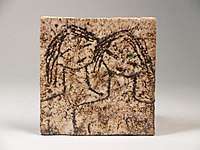Theo Dobbelman
Theodorus Antonius Hubertus Maria (Theo) Dobbelman (Nijmegen, 22 October 1906 – Montalivet-les-Bains, France, 7 September 1984) was a Dutch sculptor, ceramist and painter.[1]
Theo Dobbelman | |
|---|---|
| Born | Theodorus Antonius Hubertus Maria Dobbelman 22 October 1906[1] |
| Died | Montalivet-les-Bains, France |
| Nationality | Dutch |
| Education | Academie Minerva ; De Koninklijke Porceleyne Fles[2] |
| Known for | Ceramics |
Dobbelman came into prominence as ceramist and leader of the experimental division of De Koninklijke Porceleyne Fles in Delft since 1956. He also taught at the Royal Academy of Fine Arts in Amsterdam.
Biography
Early life
Dobbelman (also: Dobbelmann) was the son of soap maker and politician Pierre Dobbelmann. He initially studied chemistry at the Swiss Fribourg, where he also graduated. He settled in Amsterdam, where he befriended ceramist Just van Deventer.
From 1941 he worked with him in his company Tanagra Pottery. After the Second World War Dobbelman left the business, and he worked as an independent artist. In 1956 he became the leader of an experimental division of De Koninklijke Porceleyne Fles in Delft. The department focused on the renewal of ceramics as art form. Early pupils out there were Lies Cosijn and Jet Sielcken.[3] One of the latest pupils out there was Simone Haak.[2]
Later career
Dobbelman taught ceramics associated with the Institute of Applied Art and the Royal Academy of Fine Arts, both in Amsterdam. His students included Frank van Brakel,, Hannie Mein, Francine Timmers, and Jan van der Vaart. He was president of Saint Luke Artist Association and member of Arti et Amicitiae.
Later in his life he was invested as a Knight of the Order of Orange-Nassau. Dobbelman died in France and was buried on cemetery Zorgvlied.
Work
Over the years Dobbelman contributed with numerous designs for ceramics, bronze and terra cotta, and to publications, commissions and illustrations. In 1976 the Princessehof Ceramics Museum in Leeuwarden contributed with a retrospective of his work.[4][5]
Exhibitions, a selection
- 1948. Group exhibition in Arti, Arti et Amicitiae, Amsterdam.[6]
- 1955. Sculptures in the Lijnbaan, Lijnbaan Rotterdam.[7]
- 1959. De porseleyne fles ín Paríjs, Dutch Institute in Paris.[8]
- 1965. Ceramic sculptures, indoor and outdoor, Museum Arnhem, Arnhem.[9]
Works in the public space (selection)
- Heerhugowaard, Untitled (1980), Granaat-Smaragd (Garnet-Emerald), at school "The Aventurine"
- Veenendaal, Untitled (1968), a ceramic cube at the base Kerkwijk
Photo gallery
.jpg) Flat bowl with raised edge (1949)
Flat bowl with raised edge (1949).jpg) Tile with decor of sitting girl with mirror (1955)
Tile with decor of sitting girl with mirror (1955) Tile with decor of two girl figures (1959)
Tile with decor of two girl figures (1959)- Without title (1980), Heerhugowaard
References
- Biographical data at the Netherlands Institute for Art History.
- Trudy van der Wees, "Simone Haak," at verhalenwiki.nl, last updated 22 July 2018.
- Mienke Simon Thomas. Goed in vorm: honderd jaar ontwerpen in Nederland. 2008. p. 189
- J. Romijn, Theo Dobbelman: een overzicht : keramiek, brons, terra cotta, publicaties, opdrachten, illustraties. Princessehof, 1976
- Slikke Doelen en Marius Touwen. "Theo Dobbelman". "Leeuwarder courant : hoofdblad van Friesland". Leeuwarden, 1976/10/29, p. 13.
- "Kunst Groepen-tentoonstelling in Arti," De Gooi- en Eemlander : nieuws- en advertentieblad, Hilversum, 1948/02/13.
- Adri Laan. "BEELDEN IN DE LIJNBAAN Afschrikwekkend beeld als middelpunt van goed werk". Het vrije volk : democratisch-socialistisch dagblad. Rotterdam, 1955/08/25
- Cor de Groot, "Jonge kunstenaressen verníeuwden Delfts aardewerk „De porseleyne fles” ín Paríjs". De Volkskrant. 's-Hertogenbosch, 1959/12/22, p. 9.
- Ad Interim. "Kleden aan de wand, ceramiek in de tuin in zomers Arnhem". Algemeen Handelsblad. Amsterdam, 1965/08/21, p. 19.
See also
External links
| Wikimedia Commons has media related to Theo Dobbelman. |
- Theo Dobbelmann at Capriolus Contemporary Ceramics